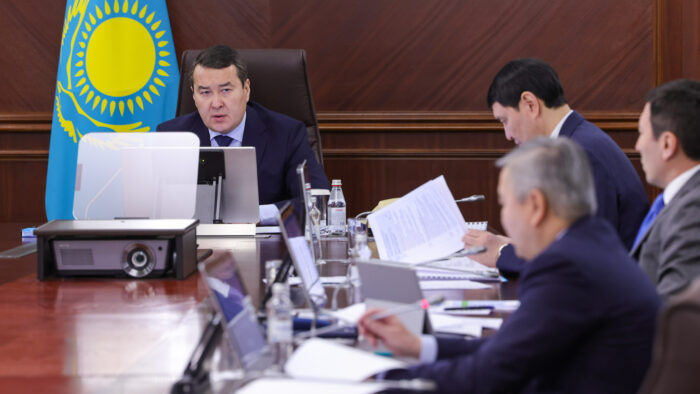ASTANA – This year, Kazakhstan plans to implement 180 new projects valued at 1.5 trillion tenge ($3.3 billion), generating over 18,000 jobs, as was announced at a Jan. 26 meeting of the Council of Domestic Entrepreneurs, chaired by Prime Minister Alikhan Smailov, reported the Prime Minister’s press service.

Alikhan Smailov chairs a meeting of the Council of Domestic Entrepreneurs. Photo credit: primeminister.kz.
These projects include a ferroalloy plant and a forging and banding complex in the Pavlodar Region, the production of truck components using iron casting in the Kostanai Region, factories for household appliance production in the Almaty Region, and components for wind power plants in the Karagandy Region.
The meeting focused on developing import substitution and enhancing Kazakhstan’s export potential in goods and services. Smailov acknowledged the growth in manufacturing exports in recent years, emphasizing the country’s sufficient potential to organize local production of a significant part of imported goods.
Minister of Industry and Construction Kanat Sharlapayev reported that the foreign trade turnover of the manufacturing industry increased by 12% to $74.2 billion in 11 months of last year. Meanwhile, Kazakh manufacturers concluded 179 long-term agreements and off-take contracts with large customers worth 66 billion tenge ($146.5 million).
To stimulate import substitution, a mechanism has been launched to supply raw materials to domestic processors at affordable prices, with 25 agreements in place for aluminum, copper, and lead. This mechanism aims to deepen processing and diversify the range of goods produced within the country.
The government also supports investment projects in the manufacturing sector, with 170 projects worth 930 billion tenge ($2 billion) launched at the end of last year, creating over 12,000 permanent jobs. As such, the production of paints, varnishes, fittings, workwear, medical furniture, thermal insulation materials, and elevators was established.
The Prime Minister stressed the importance of an integrated approach to the development of import substitution, citing the government’s adoption of a program for developing intra-country value and export-oriented production.
“Projects must be provided with accessible financing, including through extra-budgetary sources and the expansion of guarantee mechanisms, to increase the localization of production. This will empower enterprises to successfully compete with foreign suppliers,” he said.

